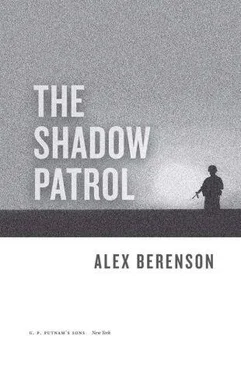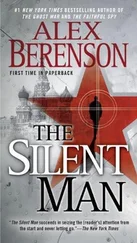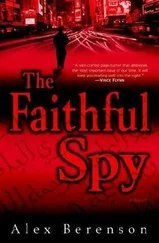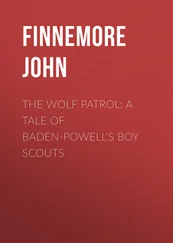Alex Berenson - The Shadow Patrol
Здесь есть возможность читать онлайн «Alex Berenson - The Shadow Patrol» весь текст электронной книги совершенно бесплатно (целиком полную версию без сокращений). В некоторых случаях можно слушать аудио, скачать через торрент в формате fb2 и присутствует краткое содержание. Жанр: Шпионский детектив, на английском языке. Описание произведения, (предисловие) а так же отзывы посетителей доступны на портале библиотеки ЛибКат.
- Название:The Shadow Patrol
- Автор:
- Жанр:
- Год:неизвестен
- ISBN:нет данных
- Рейтинг книги:3 / 5. Голосов: 1
-
Избранное:Добавить в избранное
- Отзывы:
-
Ваша оценка:
- 60
- 1
- 2
- 3
- 4
- 5
The Shadow Patrol: краткое содержание, описание и аннотация
Предлагаем к чтению аннотацию, описание, краткое содержание или предисловие (зависит от того, что написал сам автор книги «The Shadow Patrol»). Если вы не нашли необходимую информацию о книге — напишите в комментариях, мы постараемся отыскать её.
The Shadow Patrol — читать онлайн бесплатно полную книгу (весь текст) целиком
Ниже представлен текст книги, разбитый по страницам. Система сохранения места последней прочитанной страницы, позволяет с удобством читать онлайн бесплатно книгу «The Shadow Patrol», без необходимости каждый раз заново искать на чём Вы остановились. Поставьте закладку, и сможете в любой момент перейти на страницу, на которой закончили чтение.
Интервал:
Закладка:
In the medium term, the problems made little difference to the war. The soldiers and Marines in Kandahar and Helmand provinces didn’t need the CIA’s help to kill Taliban guerrillas. But in the long run, the CIA’s role was crucial. Military intelligence officers weren’t supposed to spy on the Afghan government or explore the relationships between the insurgents and Iran and Pakistan. Those jobs belonged to the CIA. But as the agency slipped, the Defense Intelligence Agency began recruiting its own sources in Kabul and all over Afghanistan.
Duto faced an unpleasant choice. Replacing King would mean admitting a big mistake, and Duto hated admitting mistakes. But he hated losing turf even more, especially since Afghanistan had always belonged to the CIA. The agency had helped battle the Soviets in the 1980s. After September 11, while the Pentagon dithered, CIA operatives helped push the Taliban from power.
And so Duto sent King home barely eleven months after naming him as station chief. In his place, Duto appointed Ron Arango, a solid officer who had served in Pakistan and Russia. As deputy, he chose Peter Lautner, who had been in Kabul for seven years. Lautner was known as especially aggressive. He had reason to be. He’d lost his wife and his brother to Marburg.
Under Arango and Lautner, the station seemed to be recovering. Lautner had rebuilt relationships with tribal leaders. Arango had taken five top Afghan intelligence officers to a counterinsurgency conference that was a thinly disguised bribe, an excuse for a vacation in Paris.
But despite the activity, the station was still foundering. Some of its recent intel had proven flat wrong. A month before, one of its best sources had reported that a senior Taliban commander wanted to defect. The “defection” was a hoax, leading to an ambush that killed an Afghan general. The station still didn’t know whether its source had lied or been used to pass along disinformation. Worst of all, the station had just lost another top agent, the deputy interior minister. A bomb hidden in a fuel tank had blown apart the minister’s armored 4Runner.
With all the problems, Wells wasn’t surprised that the station had largely been left out of the hunt for bin Laden. Langley and the Pentagon had directed the operation, with help from the NSA. Kabul had barely been involved.
SHAFER HAD OFFERED to let Wells stay in a spare bedroom while he waded through the reports. But Wells wanted to read the files without having Shafer quiz him like an annoying high school teacher. So Wells was staying a few miles from Langley in a Courtyard by Marriott. He liked Courtyards and Hilton Garden Inns and the other three-star hotels that sat on suburban feeder roads, bland, efficient boxes where every room was identical and no one noticed anyone. Every day he woke at six and worked out in the Marriott’s underwhelming gym for ninety minutes. He reached the agency by nine o’clock and read files for twelve hours, until his eyes burned. Then he headed back to the hotel.
Wells had converted to Islam more than a decade before, but in the last few months he’d hardly prayed at all. He wondered whether he’d ever regain his fervor. Perhaps he’d grown permanently weary of battling jihadis born into the religion he wanted to claim as his own. He kept his Quran on his bedside table, but he didn’t pray. Instead he watched baseball until he fell asleep, rooting for close games and miracle finishes, trading one faith for another.
After a week reading files, Wells had grown to sense the station’s different personalities. Arango, the chief of station, wrote in a businesslike, slightly bureaucratic tone. Lautner had an aggressive edge. Gabe Yergin, the number three, was hurried, almost sloppy, as though he were perpetually behind schedule, running between meetings.
By Friday night, Wells had nearly finished the files. His mouth was dry, his eyes scratchy from the closet’s stale air. Office work left him tired, but not in an honest, muscle-sore way. He wanted to put a pack on his back and hike for twenty-four hours straight. He looked up as the magnetic lock clicked open and Shafer stepped in.
“You look dazed.”
“I thought we were trying to reduce the amount of paperwork the stations generate.”
“That’s a work in progress. Plenty of memos going around about it, though.”
Wells laughed.
“You caught up?”
“Pretty much.”
“Duto wants to see you, talk about it.”
“He works this late?”
“You kidding? He’s got some fancy dinner tonight. With Travers and McTeague, I think.” Congressman Raymond Travers and Senator Hank McTeague were the chairmen of the House and Senate committees that oversaw the CIA. “Duto will tell them stories about Sarkozy and Carla Bruni, make them think they heard something that they couldn’t have read on Page Six.”
“Sounds like fun.”
“Better him than us. Anyway, he’s coming by your hotel at ten tomorrow. I’ll be there, too. Try not to sleep late.”
“Yes, Your Highness.”
WELLS STEPPED OUT of the Courtyard’s freshly mopped lobby at ten the next day, just as a black Chevy Tahoe rolled up the driveway. Inside the Tahoe, Duto and Shafer. Duto wore the weekend uniform of the powerful, gray windbreaker, blue shirt, pressed khakis. He was nearly sixty, and his hair had thinned since Wells had seen him. Otherwise he hadn’t changed. His handshake was firm. His smile was all lips and no eyes.
They rolled out, turned left toward D.C. Two identical black Tahoes followed.
“Subtle pickup,” Wells said. “You should just paint ‘CIA Taxi’ on the doors.”
Wells and Duto didn’t get along. Their mistrust wasn’t playful. It wasn’t a light banter that hid mutual affection. They simply disliked each other. Wells had quit the agency because of Duto. Yet they seemed to need each other. Several months before, the CIA had helped Wells on his mission to Saudi Arabia. Now it was Duto’s turn to ask for a favor.
“How are you, John?” Duto’s voice was quiet. Almost silky. Wells wondered whether Duto was taking vocal training. He had once been famous for his temper. But years as director had taught him restraint. Let others squabble. The ultimate decision belongs to me. No need to show my claws. Wells wanted Duto to go back to being a screamer, but so far Wells hadn’t managed to provoke him.
“Fine.”
“And Anne?”
“She’s fine, too.” Wells wondered whether Duto remembered her name or had been briefed. “Though my son seems to have decided I’m a war criminal. Never wants to see me again.”
“That’s too bad.” Duto didn’t exactly sound torn up.
“I’m sure he thinks even worse of you.”
“They have no idea what we do for them. What it takes to keep them safe.”
“We’re five miles from the Pentagon,” Shafer said. “Around here, most of them are us .”
“You know what I mean. Civilians.”
“They know exactly what we do,” Wells said. “That’s the problem.”
“We killed Osama. And no civilian casualties in the op. Not one. Ten years since nine/eleven and no real attacks on American soil. Not even jerks with AKs lighting up a mall. We’ve kept our people safe. Tell me that doesn’t count for something, John.”
They turned onto the Chain Bridge. Wells watched the Potomac rush by. Knowing he’d have to answer. Knowing Duto was right. “Okay. You win. You sound like you’re planning to run for something—”
A smile curled Duto’s mouth and then was gone, brief and shocking as lightning in a cloudless sky. Suddenly, the good suits and voice lessons and personality transplant made sense. Impossible, Wells almost said. You’re only fooling yourself.
Duto was more powerful than any senator or congressman. Only one elected office would be worth his effort. But the presidency was off-limits to anyone too deeply involved with the agency. The first George Bush was the only director ever to have won the presidency, and he’d served at Langley barely a year. Duto had spent most of his adult life at the CIA. His fingerprints were on the agency’s most controversial programs. His record couldn’t possibly bear public scrutiny.
Читать дальшеИнтервал:
Закладка:
Похожие книги на «The Shadow Patrol»
Представляем Вашему вниманию похожие книги на «The Shadow Patrol» списком для выбора. Мы отобрали схожую по названию и смыслу литературу в надежде предоставить читателям больше вариантов отыскать новые, интересные, ещё непрочитанные произведения.
Обсуждение, отзывы о книге «The Shadow Patrol» и просто собственные мнения читателей. Оставьте ваши комментарии, напишите, что Вы думаете о произведении, его смысле или главных героях. Укажите что конкретно понравилось, а что нет, и почему Вы так считаете.

![Brian Jacques - [Redwall 10] - The Long Patrol](/books/128376/brian-jacques-redwall-10-the-long-patrol-thumb.webp)










